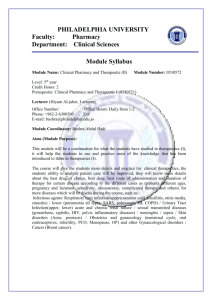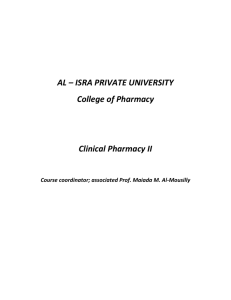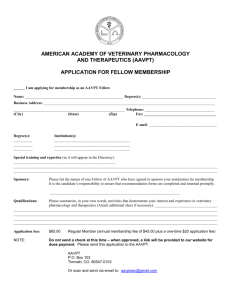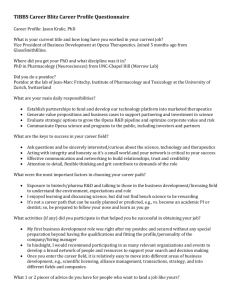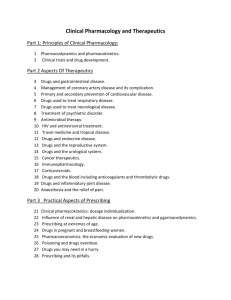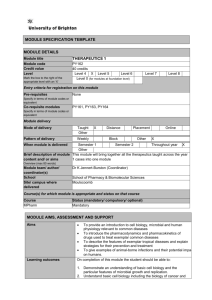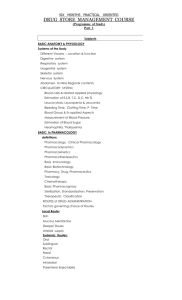Therapeutics 1 0530571 - Philadelphia University
advertisement
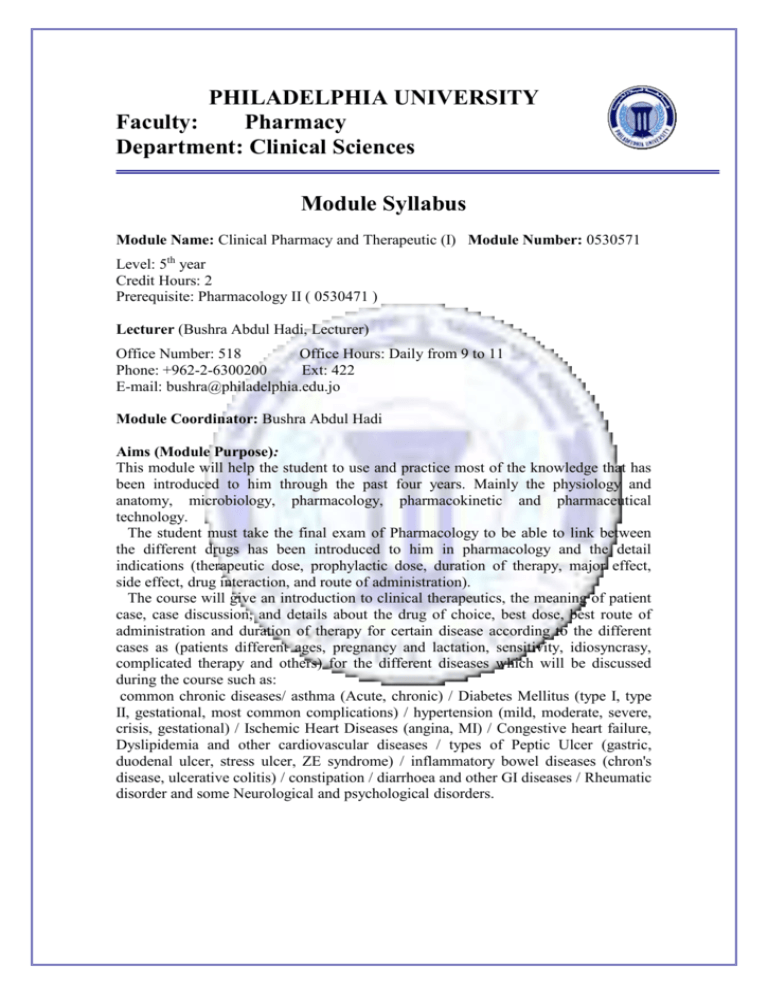
PHILADELPHIA UNIVERSITY Faculty: Pharmacy Department: Clinical Sciences Module Syllabus Module Name: Clinical Pharmacy and Therapeutic (I) Module Number: 0530571 Level: 5th year Credit Hours: 2 Prerequisite: Pharmacology II ( 0530471 ) Lecturer (Bushra Abdul Hadi, Lecturer) Office Number: 518 Office Hours: Daily from 9 to 11 Phone: +962-2-6300200 Ext: 422 E-mail: bushra@philadelphia.edu.jo Module Coordinator: Bushra Abdul Hadi Aims (Module Purpose): This module will help the student to use and practice most of the knowledge that has been introduced to him through the past four years. Mainly the physiology and anatomy, microbiology, pharmacology, pharmacokinetic and pharmaceutical technology. The student must take the final exam of Pharmacology to be able to link between the different drugs has been introduced to him in pharmacology and the detail indications (therapeutic dose, prophylactic dose, duration of therapy, major effect, side effect, drug interaction, and route of administration). The course will give an introduction to clinical therapeutics, the meaning of patient case, case discussion, and details about the drug of choice, best dose, best route of administration and duration of therapy for certain disease according to the different cases as (patients different ages, pregnancy and lactation, sensitivity, idiosyncrasy, complicated therapy and others) for the different diseases which will be discussed during the course such as: common chronic diseases/ asthma (Acute, chronic) / Diabetes Mellitus (type I, type II, gestational, most common complications) / hypertension (mild, moderate, severe, crisis, gestational) / Ischemic Heart Diseases (angina, MI) / Congestive heart failure, Dyslipidemia and other cardiovascular diseases / types of Peptic Ulcer (gastric, duodenal ulcer, stress ulcer, ZE syndrome) / inflammatory bowel diseases (chron's disease, ulcerative colitis) / constipation / diarrhoea and other GI diseases / Rheumatic disorder and some Neurological and psychological disorders. Teaching Methods: Lectures and seminars. Learning Outcomes: At the end of this module, the student will be able to: 1. An understanding for the meaning of patient case which is based on SOAP method (Subjective, Objective, Assessment, Plan) generally. 2. As the students will be introduced to the SOAP method and will apply it for the different diseases, by the end of the course they will be able to distinguish between the different diseases symptoms. 3. Students will be able to find out the diagnostic method should be done for the patient according to the symptoms and history of each disease. 4. The students should be able to put a full plan (treatment) for the patient; a) Treat the emergency case for the different diseases. b) Give the best drug treatment (major drug) not just for the disease but for the certain patient as well, by introducing them to the major treatments and the clinical alternatives for the same disease. c) Treatment for the complications of the diseases as well. d) To know the meaning of prophylaxis and maintenance therapy (chronic therapy) and when to use them. e) Give the best symptomatic therapy (side drug) for each disease. f) To be familiar with surgery names needed for some diseases. g) Should know the doses range generally and when to make dose adjustment. h) Should know the duration of therapy for the disease and for each case. i) Should know the routes of administration use according to the disease, drug, and patient case. j) Students should know how to make follow up for the patient (monitoring) k) Further more students should know the importance of the life style and the rehabilitation for the improvement of some diseases. 5. The students must know how the pharmacokinetic of the drug can be influenced by different factors. 6. The students should know the meaning of contraindications (CI), and what are the contraindicated drugs for the different cases. 7. Students will be introduced to different Adverse Drug Reactions. Module Outline: Week Date (1) (2) (3) (4) (5) (6) (7) (8) (9) (10) (11) (12) (13) (14) (15) (16) Subject Introduction: Cases, SOAP method. Applied examples. GI disorder and rheumatic disorder. Types of Peptic Ulcer (gastric, duodenal ulcer, stress ulcer, ZE syndrome). Inflammatory bowel diseases (chron's disease, ulcerative colitis)/constipation and diarrhoea. Cardiovascular disorder Hypertension: mild, moderate, severe, crisis, gestational. Ischemic Heart Diseases (angina, MI) Congestive heart failure and Dyslipidemia. Asthma:Acute Asthma:Chronic DM :type I, type II DM: gestational, most common complications DM: treatment of the most common complications CNS disorder Final Exam Week Modes of Assessment: Modes of Assessment: Score Date th First Exam 20 6 week Second Exam 20 12th week Assignment / Seminar / Project / 10 4th, 5th, 10th and 11th week Quizzes / tutorial Final Exam (Comprehensive; written, 50 16th week verbal, hand-ins … etc...) * Make-up exams will be offered for valid reasons only with consent of the Dean. Make-up exams may be different from regular exams in content and format. Attendance Policy: Lecture attendance is mandatory. Student is allowed maximally 15% absentia of the total module hours. According to the rules you are allowed to be absent maximum for 5 hours. More than this percentage, student with an excuse will be drawn from the module. Otherwise, student will be deprived from the module with zero mark assigned. Expected Workload On average you should expect to spend at least (6) hours per week on this module. Text Book(s) and Supporting Materials: Text book: 1. Clinical Pharmacy and Therapeutics by Roger Walker, C.R.W. Edwards Publisher: Churchill Livingstone; 3rd edition (February 1, 2003) ISBN: 0443071373 2. Applied Therapeutics: The Clinical Use of Drugs by Mary Anne Koda-Kimble, Lloyd Yee Young, Wayne A. Kradjan, B., Joseph Guglielmo, Brain K. Alldredge, Robin L. Corelli Publisher: Lippincott Williams & Wilkins; 8th edition (June 1, 2004) ISBN: 0781748453 In addition to the above, the students will be provided with handouts by the lecturer. References: Students will be expected to give the same attention to these references as given to the Module textbook(s) 1. Clinical Pharmacy and Therapeutics/Workbook for Clinical Pharmacy and Therapeutics by Eric T. Herfindal, Dick R. Gourley, Linda Lloyd Hart, D. R. GOURLEY Publisher: Williams & Wilkins; 5th edition (February 1, 1992) ASIN: 0683039660 2. Clinical Pharmacology by D. R. Laurence, P. N. Bennett, M. J. Brown Publisher: W.B. Saunders Company; 8th edition (April 1, 1998) ASIN: 0443049904 Website(s): http://www.philadelphia.edu.jo/pharmacy/resources.html
